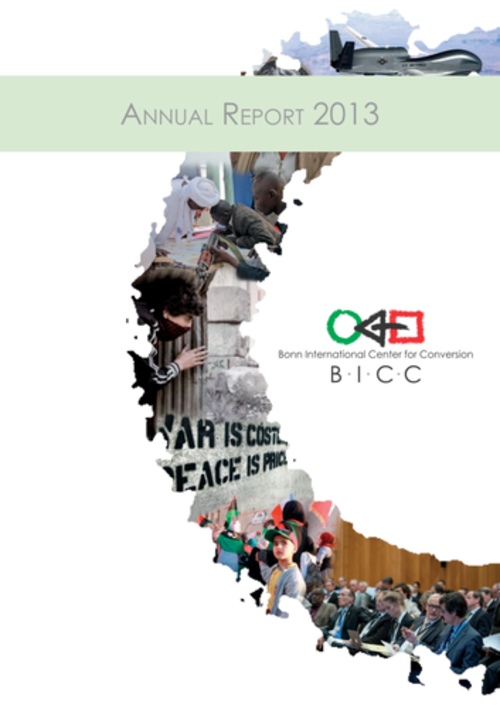Publications
Annual Report 2013
Release Date
2013-11
Language
- English
- German
Topics
- –
The year 2013 has marked the beginning of a new era at BICC with the introduction of a dual leadership structure. Conrad Schetter was appointed Director for Research in March and his position is combined with a newly established professorship for Peace and Conflict Research at the University of Bonn. This joint role is intended to intensify BICC’s academic approach and at the same time strengthen intellectual exchanges with the University of Bonn. Michael Dedek, Director for Administration, complements the management team.
A process of reorientation has now begun that will accompany us for several years to come. The Center is aiming to combine those areas of its work that have proved successful and worth maintaining with new impulses and topic areas. This 2013 Annual Report, which gives an account of BICC’s activities between July 2012 and June 2013, already bears witness to this realignment. From now on, our new concept is to focus on providing a critical and policy relevant analysis of the dynamics of organized violence. This forms the core of what we understand by “Conversion Studies” and involves three levels: Concepts, Means, and Practices.
At the Concepts level, we intend to take a closer look at how the perception of war and its concomitant processes is changing. For example, Conrad Schetter considers “Military interventions of the future” in the Editorial and analyzes interventions in the context of the trend towards technological innovations (p. 7).
The term Means refers to the immediate material dimension of organized violence: It comprises small arms as well as global military expenditures and arms exports. In the context of small arms control, in 2012/13 we have studied the dangers of MANPADS (Man-Portable Air Defense Systems) and the possible uses of “smart” technologies (p. 14). Our expertise on the safe storage of small arms and on the development of conventional control mechanisms is also in great demand. Our experts who live and work locally use our research when advising the governments of South Sudan (p. 16) and Sudan (p. 17) on capacity development.
BICC’s 2013 Global Militarization Index (GMI) shows that the Middle East remains the world’s most highly militarized region (p. 10). We analyze global arms expenditures and trends regarding global and German arms exports.
We have launched the “War and Peace” Internet portal in association with the German Federal Agency for Civic Education (p. 18). The data and facts it contains on the dynamics and means of organized violence represent a unique instrument in the field of political education.
Military sites are also included under Means. The conversion of former military sites is one of BICC’s classic tasks. In this area too, best practices demonstrate the introduction of new ideas (p. 20).
With the term Practices, we refer to the entire process of discernible changes in organized violence and are currently focusing our attention on military regimes that are involved in situations of upheaval. We are conducting research on the political economy of the military in countries of the Arab Spring (p. 22). A further project is devoted to studying in how far the role of the military in Myanmar and various potentials for conflict are influencing the country’s transformation and what this means for Germany’s foreign cultural and education policy (p. 21).
“Natural Resources” and “Migration and Borders” are two further key areas of our work. These highly relevant societal topics also show evidence of organized violence.
The Annual Report takes up the links between organized violence and natural resources in three project reports. In this context, we are using various methods—including remote sensing and field research—to study the interrelationships between conflict constellations and the exploration of resources such as small-scale coal mining in Afghanistan (p. 25) and mining for gold, diamonds and oil in South Sudan, Chad and the Democratic Republic of the Congo (p. 24). A new project is raising the question of in how far the construction of large solar power plants in North Africa is having an effect on existing conflict constellations or can provoke new conflicts (p. 23).
PDF-Download
BICC_annualreport_2013_en.pdf
[English] (3.44 MB);

PDF-Download
BICC_Jahresbericht_2013_dt.pdf
[German] (3.46 MB)

Cite as
@techreport{bicc2013,
title = "Annual Report 2013",
latexTitle = "Annual Report 2013",
publisher = "bicc",
institution = "bicc",
type = "BICC Annual report",
year = "2013",
address = "Bonn",
}
Document-Type
BICC Annual report
Publisher
bicc
Place
Bonn



